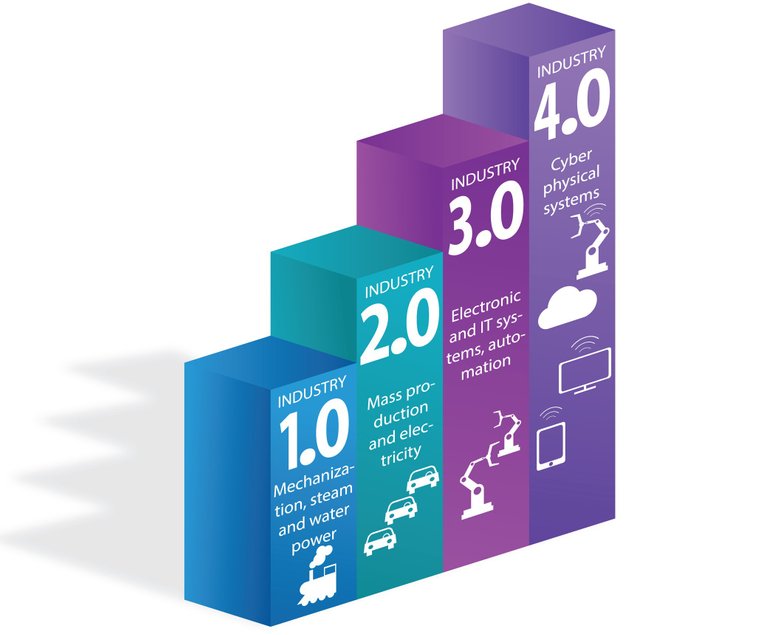
I’ve been thinking deeply about the future of everything and several macro level trends that are disrupting companies and societies. And I like thinking about the cause-effect relationships these trends have on business and people because it’s like a giant puzzle.
Alot of people are scared about the 4th Industrial Revolution (4IR), but there are alot of mavericks that are trailblazing or pioneering new careers, paths, companies and even industries & overhauling old norms and traditional wisdom in doing so.
What I have realized is that many of them focus on a few key trends really well. But what makes the 4th Industrial Revolution daunting to almost everyone is that there is mounting pressure on everyone to get everything right and to perform perfectly. This immense pressure stems from the accelerating rate of internet adoption and the fact that everyone is in a different journey in their personal or professional life. However, every person wants to be as perfect as possible and fit into society perfectly. And this is the source of alot of the problems we are seeing in today’s world. I think there is a digital divide where people who are comfortable and open about who they truly are and what they want are advancing far faster “seemingly” than the rest.
The truth is everyone wants mainly the same things in the end. But the internet has polarized civilization because every person is chanting something different on the internet. I think we should just accept that some diversity and difference of opinion is healthy. But people also need to get on a common page and have an understanding of where the future is heading so they have some peace. The paradox of the 4th Industrial Revolution is that while you can have a good sense of where the world is heading, it’s very complicated at the same time, and everyone needs to be very comfortable with being uncomfortable at least for now, as we don’t know everything. We have to be comfortable knowing we don’t know everything and admit what we know and admit what we don’t know.
I want to talk about the forces that I think are shaping the 4th Industrial Revolution because many of these will probably have crossed your mind at some point in the recent past.
The forces shaping the 4IR are Financial, Technological, Social, Demographic, and Planetary Mega Shifts.
In the finance world, I have been paying attention to growing scrutiny of Wall Street and I think that there are some troubles with old models of quantitative easing, central banks and monetary policy that is unsustainable.
There rightfully is a growing trend toward ESG (Environmental, Social and Governance), Socially Responsible and Impact Investing among millennials and certainly among younger “woke” generations. People want to work for better companies and business leaders (as employees), shop at better brands (as consumers) and make a better impact ultimately (as people). People are starting to realize this and want to invest in companies that build better brands ultimately (as investors). Now “better” is not just subjective and perceived but its contextual and can be quantified in a data-driven methodology. In fact, there are well defined ESG metrics from MSCI which ultimately uses Big Data and AI to rate ESG scores of companies in ESG funds.
Also profit now is not the only thing that defines a bottom line. People, planet and purpose now define the bottom line of a company before profit. This is the same thing as ESG basically. But it reiterates the point that there is growing demand to take care of people (and not burn them out at work), to take care of the planet (and not waste resources, transition from fossil fuels to a clean energy economy), and to define the purpose (or mission of organizations, so leadership and talent can work meaningfully and harmoniously with an aligned purpose).
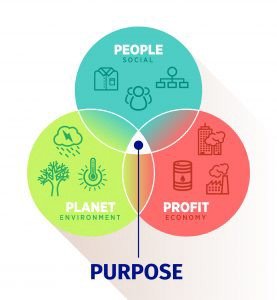
This doesn’t just end up having a good “brand image”, and doing good things ironically. Personally, I believe it is the RIGHT thing to do this stuff WITHOUT QUESTION. However, all of this ends up building better companies, better leadership, better talent and organizational alignment. It builds the longevity of a company, increases talent retention (with a happier, healthier, flexible, productive and engaged workforce). It also ironically improves the bottom line of a company, improves the perception and brand image of a company. Although those need to be second.
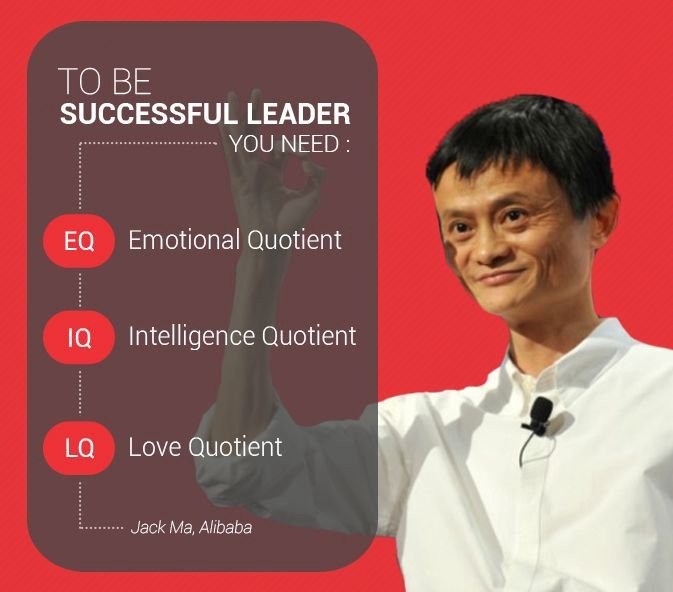
In terms of the Future of Leadership, I believe we are moving from IQ to EQ and like Jack Ma said to LQ. Intelligence is not an SAT score or a GPA or college pedigree or a job promotion. You look at any prominent business leader maverick (particularly in tech or innovation) today, and almost all of them agree that these are not the metrics that made them highly successful. In fact it’s everything else (nontraditional wisdom), from their problem-solving and creative skills to their resourcefulness that made them successful.
I believe too many people have a narrow definition of Intelligence and it will not serve them well in the 4th Industrial Revolution. Because the paradox of the 4th Industrial Revolution is that in order for you to get ahead, you have to uplift or help others get ahead. This is a break from many people being “In it for themselves”. Many people just want a paycheck or a stable job, but that’s not how our economy works anymore on a fundamental level. This is going to be more “true” as each year passes especially right now. The world is changing faster than ever, and we need to work together, cooperate (not just compete) and not just share information and data but share actionable intelligence and wisdom to get ahead.
Alot of people are miserable in today’s world, I think because they feel they have to be other people or fit into narrow molds to get ahead. However, I believe you can and should be yourself (its genuine and you don’t need to “fake it to make it”) and do better in today’s world. In fact, everyone who is seemingly very successful through a combination of multiple circumstances (such as luck, timing, opportunity and skill) however through counter-intuitive wisdom has found their place in today’s world.
However there are certain shared values that we should have in the 4th Industrial Revolution. These values are all human-centric. We need to encourage neurodiversity, creativity, empathy, love, passion, risk-taking, exploration, wonder and curiosity. Too many people are just chasing mindless hustle and money, however I don’t believe that will make anyone rich, happy or successful (metaphorically and realistically) in today’s world. People are just going to end up more miserable if they constantly compare their own materialism to others and we will end up in a hedonistic, mindless and destructive society if we tread that path. We need to change our mindset to adapt to the 21st century as Andrew Yang says in an economy with increasing pace of change and automation.
This should be blatantly obvious if its not already, but our technology is accelerating at the speed of light. Technology is transforming our businesses, our politics, our human civilization at an exponential rate. But the problem is, most people have a linear mindset. If you pay careful attention to historic trends or spend one day learning about the tech sector, however, you will quickly come to the realization of how fast things are changing.
But the rate of change itself is accelerating. I don’t think you need to be a rocket scientist to understand what I’m saying, but I emphasize the accelerating rate of change in exponential technologies because I believe it is wildly important and has tremendous context in today’s world.
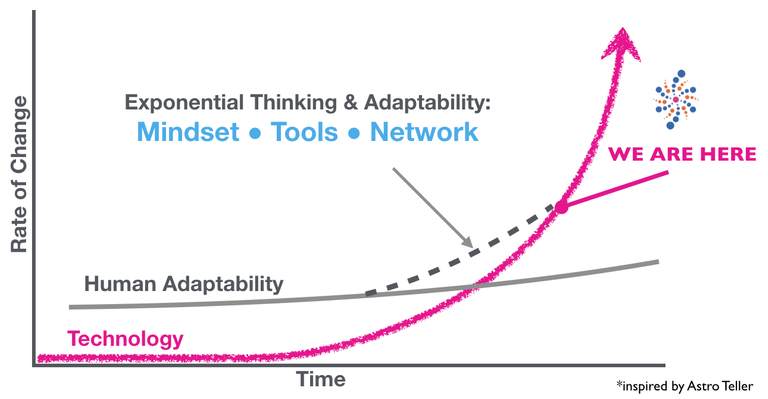
We are very fast as humans to adopt new technologies. But the problem is that as we adopt new technologies, we become too reliant on technologies and forget about our own brains, minds and loose the ability to think clearly for ourselves. Too gain some perspective, we must detach from technology more often and practice mindfulness but I digress.
Humans. We forget what we are sometimes. We are all humans. We are descendants from ancient civilizations that had primitive technologies. Now we are a very advanced civilization with advanced technology. However, the problem is that we don’t realize this and we forget about it! You think the Greeks or Romans however many BC ago used Reddit or had access to the internet? Now we don’t even think about it. And the problem with modern humans is a lack of perspective.
I believe people are loosing touch with reality and the ability to stay grounded. We live on a planet called Earth. We are humans. And now through a series of miracles we have incredibly advanced societies, cities, technologies, and people. We are so incredible that we don’t realize how incredible we are and the time we are living in is based off chances.
What are the chances that Mark Zuckerberg invented Facebook? What are the chances that the railroad was invented? What are the chances that the US won WW2? What are the chances that Steve Jobs started Apple and invented the iPhone? What are the chances that I am writing this post right now? 1 in a trillion for each of them. World history and the future is defined by a series of happenstance (cause-effect) evolutionary events. Some things are predictable and some things are completely unpredictable. That’s just the way it is, the way it’s been and the way it always will be.
Mark Zuckerberg (like him or not) changed the course of history. Steve Jobs changed the course of history. Every single person including you and me does things on the planet Earth that changes the course of history (in hindsight) and impacts the future for better or worse.
In Ray Kurzweil’s book “The Singularity is Near”, Ray talks about the 6 evolutionary epochs of human history. We are currently alive in the 5th Epoch where humans are starting to fully harness the potential of digital technologies.
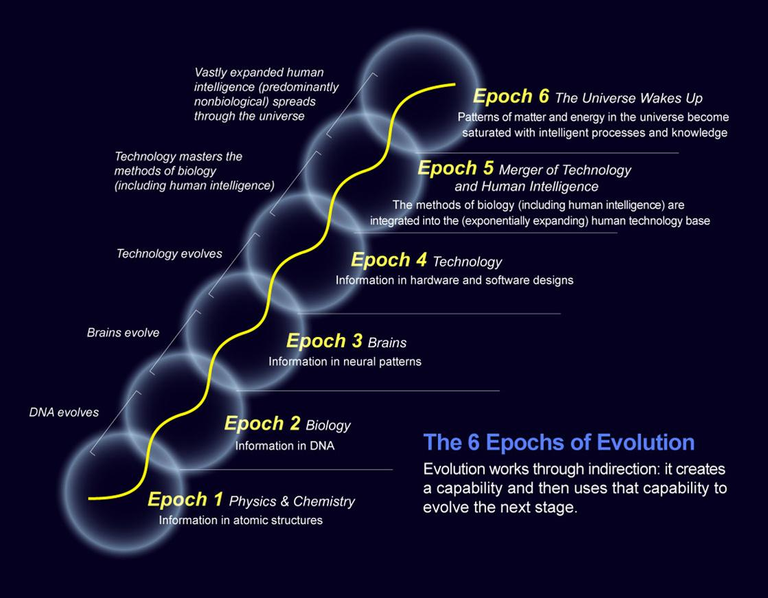
As Peter Diamandis says the future is faster than we think, and I do think that we are approaching a Technological Singularity. I say that not to be “right” (I don’t give a damn, quite frankly, never have given a damn about “being right”), to emphasize the drastic change that I’m expecting along with many other tech heads in today’s world. It’s dozens of emerging, exponential technologies that will transform industries, jobs and traditional careers overnight such as Artificial Intelligence, Quantum Computing, Blockchain, Internet of Things, and 5G. We are building smart cities and autonomous vehicles, cryptocurrencies.
The problem is that emerging technologies and disruptive business models are evolving and advancing faster than our ability as humans to adapt and process the change. I call these changes shock waves, and these shock waves are becoming bigger and coming at us faster and faster.
Chinese VC Kai-Fu Lee estimates in his book AI Superpowers: China, Silicon Valley, and the New World Order that about 40% of current jobs will be eliminated within 15 years (that book was written in 2018). Personally, I think that number will be way higher way sooner because of the deceptive nature of exponential change, the increasing investment in these technologies in the corporate & startup world, and the ubiquity of web technologies. I also think that Kai-Fu Lee is only accounting for AI. When you account for combinatorial megashifts and combine multiple technologies such as AI, 5G, Blockchain, Robotics as well as Biotech, Nanotech, and Cryptocurrencies that number gets way higher way sooner.
Personally, I predict that 75% of current jobs will be wiped out within the next 5 years. Now, I need to add that that number will be heavily offset by increasing jobs toward high-tech sector and the new digital economy that is being built especially within the next 5–10 years.
There are no more hard and fast rules. Again, a rigid mindset is not helpful. A fluid and growth mindset is now helpful as the pace of change becomes vertical and as changes stagger, stack and disrupt at different rates. There is too much unpredictability and variability. Even the consulting reports by Deloitte, Accenture and Bain have something new every week because they don’t know what’s going to happen either. They are admitting it.
How ridiculous is it that no one knows what’s going to happen and everything is changing super duper fast, yet some people continue to pretend like nothing is changing at all.
Some people want hard and fast numbers, but the 21st century is a terrible time to be a control freak as Historian Yuval Noah Harari says.
However, the problem is that the United States needs more entrepreneurship in the short term (as well as a social safety net [#Yang Gang]) and I believe an excess of consolidation (and mergers & acquisitions) in big tech is very unhealthy. The US needs a healthier innovation ecosystem that is spread out from just Silicon Valley and Big Tech.
For that innovation ecosystem to spread, I believe we need the social safety net so that more people have some safety as the Gig Economy goes mainstream to take more risks and build an entrepreneurial economy. We need more smaller businesses that partake in this high-tech economy, healthier technology venture capital (Chamath Palihapitiya is working on this with Social Capital) and digital banking services. We need to encourage risk-taking, entrepreneurship. But America needs to be united and not divided.
I do think that people will be okay and survive but it’s going to be a series of very tough transitions which will require resilience, foresight and empathy. Our economy and human civilization is changing completely overnight. I think a certain risk-taking and opportunistic mindset is needed and (I will make a separate post on how I cultivated my own mindset). The other thing is that there will be concerns about regulations and ethics.
I think the biggest thing is we can’t go about solving any of these problems alone as a single person, or as a single company, or as a single government but as a single country united. Because the problem is polarization. Everyone is polarized and in a blame, fear or narcissistic mindset where they want to protect their own interests. Our overall interests are now shared and mutual. There is no more ME. There is only WE.
In a few years we will have Brain Computer Interfaces on the market that will look nothing less than what you see from Black Mirror, the dystopian Sci-Fi show on Netflix. Personally, I don’t think we should put chips in our heads. I say that to point out how fast our technology is advancing however.
I think we should prioritize health and wellness (such as practicing meditation and mindfulness) instead of increasing pressure on an already stressed and anxious workforce. Particularly, younger generations that are suffering from higher rates of burnout and malaise. Because technology can’t solve all of our problems. Ironically, I do like the Head Space App however for meditation. There are somethings, that people need to solve however.

There are moral lines that we need to ALL draw together because otherwise we are really going to head towards a disaster. I also believe younger people need to be more wary of adopting certain technology, use technology more mindfully and minimallistically (This warrants a separate post on general mindfulness & wellness in the 21st century) and demand better and more socially useful technology products from tech companies.
I also believe we should use technology to amplify humanity and not reduce it. What I mean is using technology in beneficial and mindful ways.
Our technology is racing ahead to the moon, and people still debate, argue and worry about things that quite frankly don’t matter a damn in today’s world. Our hyper polarized world is going to get more and more polarized if people continue to act like they don’t have control or a voice over some of these greater issues (such as economic dislocation, automation, climate change, politics). In fact, if people continue to act like they don’t have control, then I’ll tell you something, our world will get worse and worse. Our politics, business environment, social issues will deteriorate and Donald Trump will be the least of our worries.
The truth is these issues plague all of us evenly and equally. It can’t just be the responsibility of a few people to worry about all of these things.
There are a lot of problems facing and quite frankly plaguing the world and America. In business we refer to problems as opportunities.